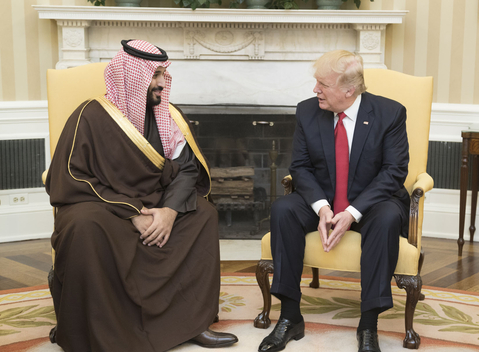 In quitting the Iran nuclear deal and doubling down on traditional US alliances, the Trump administration has forfeited key leverage and reduced its ability to resolve conflicts in the Middle East.
In quitting the Iran nuclear deal and doubling down on traditional US alliances, the Trump administration has forfeited key leverage and reduced its ability to resolve conflicts in the Middle East.
Some readjustment in US policy after the Barack Obama administration was expected and potentially useful. Both Israel and Saudi Arabia felt that the US had slighted their interests in negotiating the Joint Comprehensive Plan of Action (JCPOA), which placed curbs on Iran’s nuclear program but did not address Iran’s military and political intervention in Arab states.
However, the pendulum has clearly swung too far in the opposite direction. Even before Saudi writer and Washington Post columnist Jamal Khashoggi disappeared after entering the Saudi consulate in Istanbul on October 2, Saudi crown prince Mohammad bin Salman had demonstrated a reckless disregard for reasoned statecraft and for human rights.
His three-year plus military intervention in Yemen has yet to restore a pro-Saudi government and is en-route to creating the worst famine in a century. His blockade of Qatar is pushing a traditionally anti-Iran state closer to both Iran and Turkey. His kidnapping of Lebanese Prime Minister Saad Hariri bolstered Iran-backed Hezbollah. His jailing of prominent women’s rights advocates have made a mockery of his social reforms while his imprisonment of Saudi princes and prominent businessmen in the Ritz Carlton hotel in Riyadh led to capital flight instead of economic diversification and foreign direct investment.
It is unlikely that the crown prince would have embarked on these fiascos without feeling confident that Washington was behind him. He began the Yemen war on Obama’s watch, but the rest have taken place since Donald Trump became president and his son-in-law and adviser Jared Kushner took on the Middle East portfolio.
Apparently convinced that bin Salman could deliver Saudi support for an as yet-to-be unveiled Israeli-Palestinian peace plan, Kushner overlooked or misunderstood his new friend’s misdeeds and miscalculations. A parade of American columnists and business people also overestimated bin Salman’s “reformist” credentials or were swayed by visions of Saudi petrodollars surging into their pet causes and companies.
Israel, meanwhile, pocketed the movement of the US embassy from Tel Aviv to Jerusalem and the Trump administration’s blasé attitude toward aggressive settlement construction and violent crackdowns on Palestinian dissent, particularly in Gaza. As a result, Palestinians are boycotting peace talks and are almost certain to reject any plan Washington announces, assuming such a proposal ever appears.
The Trump administration has coupled these shifts with a massive economic and information campaign against Iran that has alienated US allies in Europe and is unlikely to reduce Iran’s influence in the Middle East. Most of that influence, after all, is the product of previous grievous miscalculations by Iran’s adversaries, from the 1982 Israeli invasion of Lebanon which helped generate Hezbollah, to the 2003 US invasion of Iraq which eliminated that country as a buffer to Iran, to the own goals scored by Saudi Arabia as enumerated above.
There is a way, however, that the US can recover leverage, beyond sanctioning Saudi Arabia over the Khashoggi affair. The US should seek back channel talks with Iran about a way to return to the JCPOA and couple that with negotiations that would prolong its restrictions on Iran’s nuclear program and allow for dialog on regional conflicts. In return for sanctions relief, Iran might be persuaded to extend its nuclear restraint beyond current deadlines. With the Syria war winding down, Tehran might also be amenable to a military pullback from that country–which would bring a measure of comfort to Israel.
In Yemen, Iran might stop its support for the Houthis in return for a security dialog with the Saudis that Riyadh has so far rejected.
All of this requires US leadership. After a contentious start, the Trump administration has shown itself capable of negotiating trade deals and even sitting down with a nuclear-armed, despotic North Korea. The US has nothing to fear from a genuine outreach to Iran that would begin discreetly, as prior talks have done, and could ultimately lead to the sort of summit that the US president seems to crave.
In the meantime, the Trump administration should work with Congress to reveal fully the Saudi role in Khashoggi’s apparent murder and penalize to the extent possible those responsible. The Saudis will bristle but their country needs American support far more than the US needs more arms sales to a regime that has increasingly gone rogue.
Barbara Slavin directs the Future of Iran Initiative at the Atlantic Council. The views expressed here are her own. Follow her on Twitter: @barbaraslavin1.
Image: President Donald Trump speaks with Saudi Crown Prince Mohammed bin Salman at the White House on March 18, 2018 (Wikimedia Commons)
